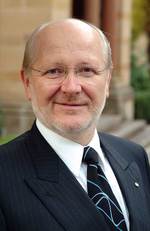From the Vice-Chancellor
I've often written about the need for greater investment in higher education in Australia - and, by that rationale, in our own University. But there are many people in the community who would be forgiven for thinking that higher education funding is at the very least adequate, if not ample. One reason why this perception might arise is because of the myriad of funding announcements universities such as ours make or are part of every year. Australian Research Council grants, National Health and Medical Research Council grants, funding from the Federal and State governments for research centres... these are just some of the many ways in which our University earns funding so that we - as a not-for-profit organisation - can reinvest that funding into our education and research programs. While we are extremely grateful for every cent we receive, and we are always very excited and proud to be able to make these kinds of announcements, the reality is that often the money we receive is not enough to cover the cost of the work. Funding in higher education is becoming an increasing struggle every year, which puts our staff and facilities under pressure. More than ever we are relying on the generosity of our alumni and friends to provide much-needed support, such as for scholarships or the maintenance of our heritage buildings. To give you a good example of the kind of scale we are dealing with, the University of Adelaide is currently committed to a capital works program costing $400 million over four years. This money will go towards facilities and infrastructure on our North Terrace, Waite and Roseworthy campuses to significantly enhance our learning and teaching environment, strengthen our research capacity and contribute to our - and the State's - environmental sustainability. But it does not come easily and much of the money will be borrowed. Higher education in general is expensive - research is also very expensive. For every dollar we earn in research, the University needs to spend $1.50 just to make that research happen. This is because most research agencies marginally fund research. It can be hard to understand what that means for a research-intensive university such as ours - it is a big issue, and yet we remain the State's premier organisation for research, making huge gains for South Australia and the nation. We want to continue to make those gains, and to grow our research at a national and international level. These issues are the reason why the University of Adelaide has been striving to achieve sustainable financial growth in recent years. We must be sustainable in order to produce the level of education and research that the community demands of us. I'm pleased to say that over the past six years we have consistently achieved excellent financial results, supported by strong growth in students and in research performance. In yet another strong financial performance, last year the University had an operating surplus of $33.9 million and a 10% increase in net assets. Our University contributes an enormous amount to the economy (education is now one of Australia's top exports), to the community through the quality of our education, through our research, and ultimately through our graduates who go on to make a unique contribution in their fields of employment and to society. But it costs a lot to run a university such as ours, and there's no doubt that we could always do with more financial support. PROFESSOR JAMES A. McWHA
Vice-Chancellor and President
|





